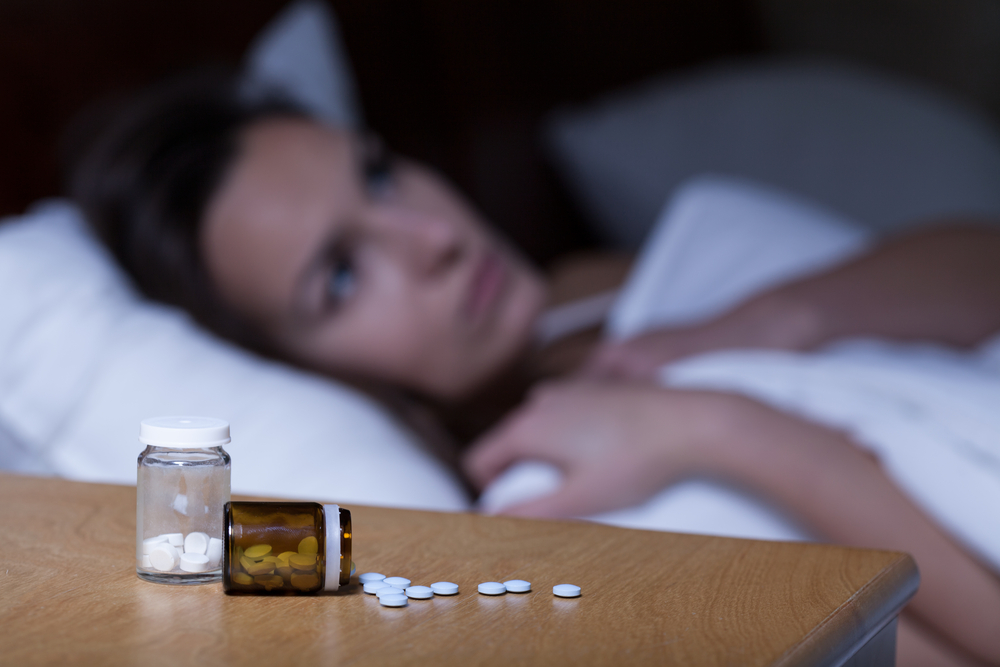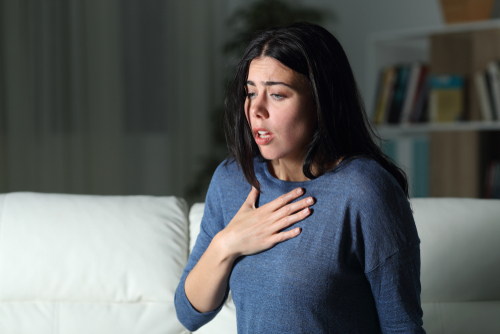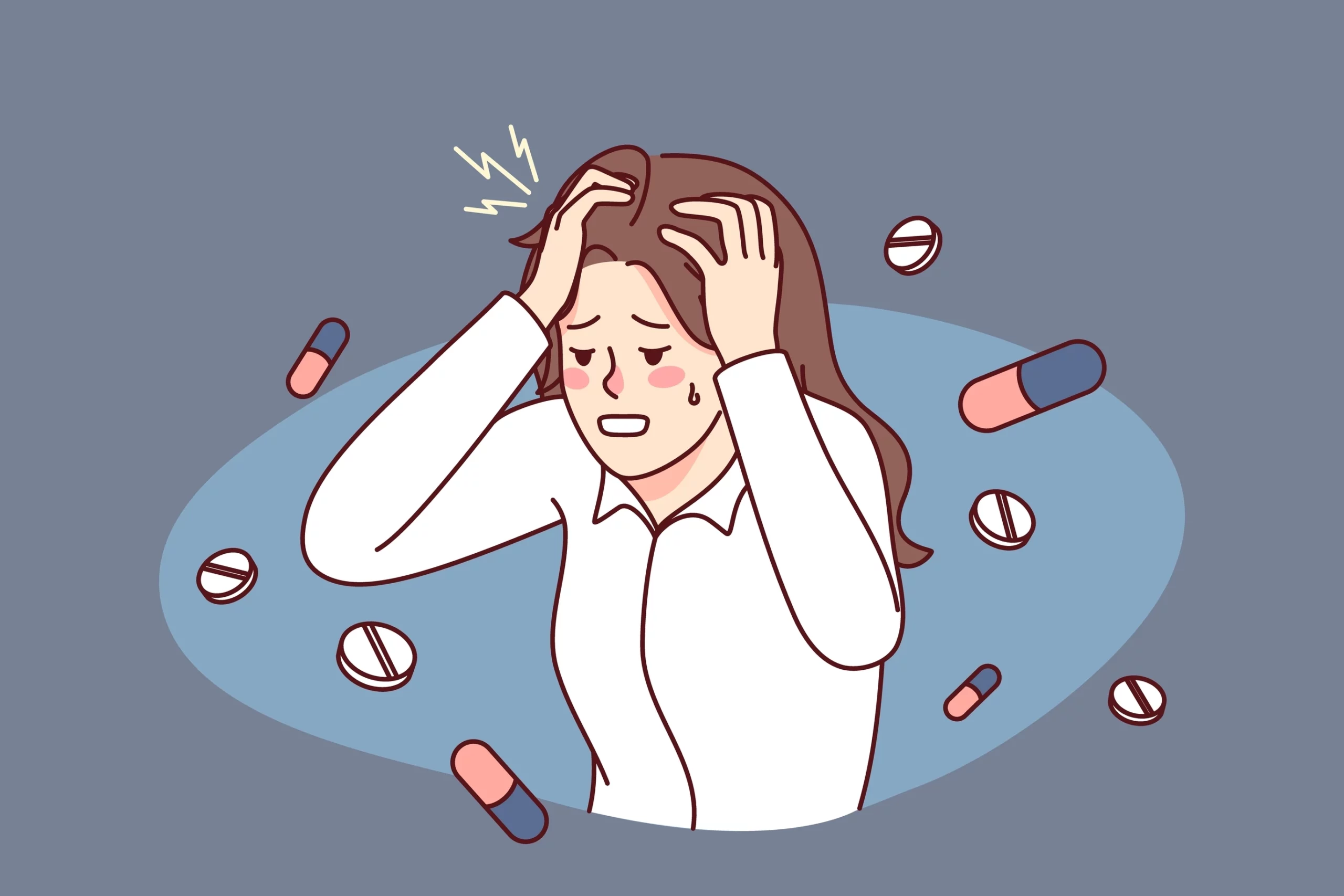Oxycodone is an opioid painkiller used to treat severe pain. While it can temporarily relieve anxiety symptoms, Oxycodone comes with risks.
Oxycodone works in the brain to change how your body senses pain. Common brands are OxyContin, Endone, and OxyNorm. It comes in various dosages, tablets, capsules, suppositories, and liquids.
Nearly 10% of young adults have abused Oxycodone at some point. Misuse can lead to addiction, overdose, and even death. Be very careful if taking Oxycodone for anxiety. It should only be used short-term and under the close supervision of a doctor. Safer alternatives may be available.
If you’re struggling with anxiety, talk to your doctor about treatment options like therapy, lifestyle changes, or medications specifically for anxiety disorders. Many resources are available to help you live a happy, healthy life.
Does Oxycodone Cause Anxiety?
Oxycodone binds to opioid receptors in your brain that regulate pain and emotions. While this can temporarily relieve anxiety, chronic use often worsens anxiety symptoms. Your brain adapts to the drug, needing more to feel normal. This fuels a vicious cycle of craving and withdrawal that sparks feelings of restlessness, worry, and panic.
Oxycodone can also trigger anxiety in those without a history of it. The euphoric high often comes with feelings of sedation and clouded thinking. As the drug leaves your system, this artificial tranquility gives way to a dysphoric crash that activates your body’s fight or flight response. Your heart races, palms sweat, and worries swirl.
The relationship between Oxycodone and anxiety is complex. For some, Oxycodone offers an escape from anxiety, but for others, especially with long-term use, it breeds anxiety anew. Understanding how this drug truly impacts your mental health may help you make more informed choices about if and how you use it.

How Oxycodone Can Cause Anxiety
Oxycodone can trigger anxiety or worsen symptoms you already experience. Why does this happen? As you know, Oxycodone works similarly to your body’s natural endorphins by binding to opioid receptors in your brain that regulate pain and emotions.
Initially, Oxycodone causes a rush of endorphins that make you feel good and ease anxiety. However, with ongoing use, two important changes in your brain can fuel anxiety. First, your brain makes less of its endorphins since the Oxycodone is filling in. This makes you less able to manage anxiety and stress on your own.
Second, parts of your brain, like the amygdala, become extra sensitive. The amygdala is involved in the “fight or flight” response, and Oxycodone seems to put it on high alert. This can make normal worry or tension feel much more intense and harder to shake.
Anxiety may feel uncontrollable between dependence on the drug for endorphins and a hyper-reactive amygdala. The solution is to break free from Oxycodone. As difficult as it may be, quitting the drug is the only way to restore your brain’s ability to regulate emotions and ease anxiety healthily.
Short-Term Oxycodone Use and Anxiety
Short-term use of Oxycodone can cause or worsen anxiety symptoms in some people. The stimulating effects of Oxycodone on your central nervous system may lead to:
Feelings of restlessness, irritability, and difficulty concentrating. These side effects tend to be more pronounced when you first start taking Oxycodone or when your dose is increased.
Sleep problems like insomnia. Not getting enough sleep can intensify symptoms of anxiety and restlessness. Talk to your doctor about adjusting the timing or dose of your Oxycodone to improve your sleep.
Withdrawal symptoms when the effects of Oxycodone start to wear off. This can include increased anxiety, agitation, sweating, and rapid heartbeat. Your doctor may switch you to a longer-acting opioid or adjust your dosage and timing to minimize withdrawal effects.
The anxiety-provoking effects of Oxycodone tend to improve over time as your body adjusts to the medication. However, your doctor may need to adjust or change your pain management plan if anxiety symptoms are severe or persistent. Alternative options include non-opioid medications, physical therapy, counseling, or non-drug therapies.
Signs and Symptoms of Oxycodone Anxiety
Signs of oxycodone-induced anxiety can manifest in various ways:
Obsessions and compulsions: Repeated thoughts or urges that cause distress and anxiety. For example, obsessively worrying about running out of Oxycodone or compulsively taking higher doses.
Panic attacks: Sudden episodes of intense fear and anxiety, including a racing heartbeat, sweating, nausea, and shortness of breath. Worries of withdrawal or loss of access to the drug often trigger panic attacks from Oxycodone.
Free-floating anxiety: A general sense of worry, dread, or uneasiness for no obvious reason. You may feel on edge, irritable, or have difficulty concentrating and sleeping.
Phobias: Irrational fears of specific places, events, or objects that trigger anxiety and avoidance. Oxycodone can intensify existing phobias or create new ones, such as a fear of doctors or pharmacists.
With regular oxycodone use, anxiety is commonly experienced during withdrawal when the drug leaves your system. The anxiety may start within a few hours of the last dose and intensify over the next couple of days. Managing oxycodone addiction and safely withdrawing from the drug under medical supervision is critical to overcoming anxiety and improving health and well-being.
Read more: The Most Missed Signs Of A Drug Overdose

How Is Oxycodone Abuse And Anxiety Treated?
If you’re struggling with oxycodone abuse and anxiety, the good news is there are effective treatments available. The earlier you seek help, the better.
A popular option is dual diagnosis treatment, which addresses both your substance abuse issue and anxiety disorder at the same time. This integrated approach is often the most effective, as the disorders can influence each other.
Dual diagnosis may involve counseling, medication, lifestyle changes, and support groups. The specific treatment plan will depend on the severity of your anxiety and oxycodone addiction.
Oxycodone Abuse And Anxiety As A Dual Diagnosis
Oxycodone use and anxiety can exist together, which is known as a dual diagnosis. Even if you didn’t have anxiety before taking Oxycodone, it could develop on its own or as a side effect. The drug may not directly cause your anxiety but can happen simultaneously.
A dual diagnosis requires treatment for both issues. Treating only one disorder often means the other comes back. Although complicated, many options exist. The first step is an evaluation by a professional. Working together, you can find the right treatment plan for you.
Options include:
Therapy, like CBT, changes thought patterns and behaviors.
Medication for anxiety, in addition to addiction treatment.
Rehab programs that address co-occurring disorders.
Support groups to connect with others struggling with similar issues.
A dual diagnosis of Oxycodone use and anxiety can be managed with the right treatment and support. Don’t lose hope – many resources are available to help you on the path to wellness.
How Is Oxycodone Anxiety Treated?
One of the most effective treatments for oxycodone anxiety is medication-assisted treatment or MAT. MAT utilizes prescriptions like Suboxone, which contains buprenorphine, a weak opioid agonist. It latches onto the same receptors used by Oxycodone, lessening withdrawal symptoms like anxiety.
Using the medication long-term can also help reduce relapse triggers such as drug cravings. Some people use MAT for short periods until they feel strong enough in sobriety to quit. But others continue using MAT indefinitely as long as it supports their recovery. Suboxone is safe for long-term use.
MAT, especially Suboxone, is often used to treat oxycodone anxiety and addiction. It works by binding to opioid receptors in the brain that Oxycodone would normally bind to. This helps reduce withdrawal symptoms and cravings, making recovery more comfortable and sustainable.
Risk Of Oxycodone Abuse Among People With Anxiety
If you struggle with anxiety, you may be at higher risk of abusing Oxycodone. Many people turn to drugs to escape anxiety and worry, even though this only worsens the underlying issues.
Taking Oxycodone without a prescription or for reasons other than prescribed is dangerous and illegal. Anxiety and oxycodone abuse can feed into a vicious cycle. Oxycodone may temporarily relieve anxiety, but as the high fades, anxiety often returns worse than before.
This can drive a desire for more Oxycodone, continuing the cycle. Breaking this cycle requires professional help. Speaking with a doctor about treatment options for anxiety, such as therapy or medication, can help address the root cause.
Oxycodone Withdrawal And Anxiety
Oxycodone withdrawal can exacerbate feelings of anxiety. As the drug leaves your system, your body goes into overdrive to restore balance. This can trigger a rush of uncomfortable sensations, both physical and mental.
Anxiety is a common symptom during oxycodone detox. The lack of Oxycodone in your system and the brain’s attempt to recalibrate itself can make you feel on edge, worried, and panicked. Insomnia, restlessness, and irritability are frequent companions of withdrawal anxiety. These uncomfortable symptoms and strong cravings increase the risk of relapse.
The best way to safely detox from Oxycodone and minimize anxiety and other withdrawal symptoms is through medical detox. Under the care of doctors and therapists, you can detox comfortably with the help of medications and counseling.
Read more: Opiate Withdrawal Timeline: How To Physically & Mentally Prepare

Getting Treatment For Oxycodone Abuse And Anxiety
Getting treatment for oxycodone abuse and anxiety usually requires detoxing from the drug first. Detox programs monitor you 24/7 while Oxycodone leaves your system.
After detox, inpatient rehab provides coping strategies and treats co-occurring issues like anxiety. Doctors may prescribe medications for cravings and withdrawal. Rehab offers:
Individual and group therapy
Family counseling
Mindfulness and relaxation techniques
Inpatient rehab teaches you skills to stay sober and ease anxiety long-term. The supportive environment helps you focus on recovery.
Oxycodone Detox With MD Home Detox
If you’re struggling with oxycodone dependence and anxiety, the best thing you can do is seek professional treatment. Speaking with a doctor or addiction specialist about medication-assisted treatment (MAT) options can help you safely stop using Oxycodone and better manage your anxiety.
Don’t lose hope – there are many resources available to help you overcome oxycodone addiction and live free from anxiety and dependence. Contact MD Home Detox today at +1 (888) 592-7931 to find the treatment that’s right for you.

